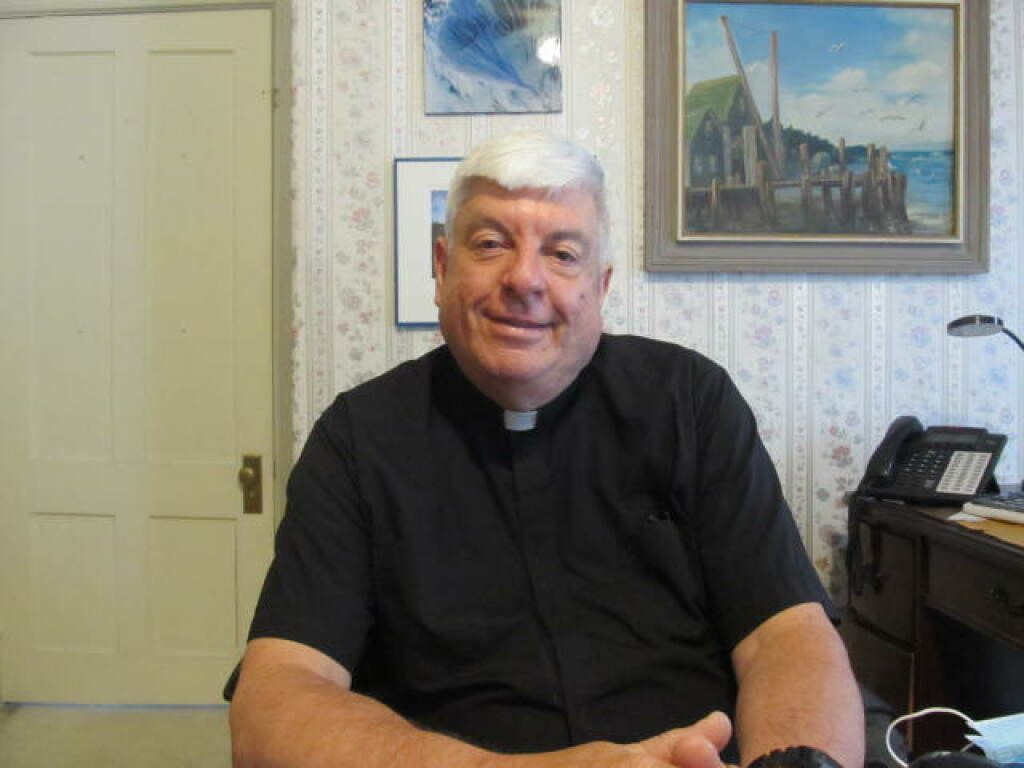 Do we know what we
means?
Do we know what we
means?
I have found delight in a story about a famous, very old organ. A well-known organist was performing a concert on the huge antique organ. Since it was not electrified, for this organ to play, there was a boy behind a screen who had to hand pump a bellows to create the air to go through the pipes. The first part of the concert was well received. At the intermission the organist received a long, standing ovation. He then walked behind the organ, and as he passed by, the boy said, “We played well, didn’t we. The organist responded rather haughtily, “What do you mean, we ?”
After the intermission, the organist returned to the keyboard console and began to play. But nothing happened; not a single note would play. Then, the organist heard a voice from behind the organ: “Say, mister, now do you know what we means?”
This Feast of the Holy Trinity celebrates a central belief of our faith, that God is a community of three persons, but only one God. This belief is so central that we begin our prayer, “In the name of the Father, and of the Son, and of the Holy Spirit.” We baptize, welcoming adults and children into the community of the Church, “in the name of the Father, and of the Son, and of the Holy Spirit.”
To guide our reflection, I think the boy behind the organ asked a good question: Do we know what we means? Do we cherish relationships, with God and with each other?
I found some interesting advice from Pope Francis, who, during a pastoral trip to the nation of Hungary, met with some young people. This is part of his remarks. “Jesus believes in you and is able to bring out the best in you. He constantly invites you to be a team player, never alone but with others: this is very important. If you want to mature and grow in life, always be a team player, in the community, sharing your experiences with others….Nowadays there is a temptation to be satisfied with a cell phone and a few friends. What a pity! Even if many people are willing to settle for that, or even if you are, it is not good or healthy. You cannot shut yourselves away in small groups of friends, talking only on your cell phone. To do so—allow me to say it—is somewhat stupid.” Pretty blunt words, are they not?
According to a U.S. Surgeon General’s Advisory, entitled Social Media and Youth Mental Health , there are certainly positive aspects of social media, such as community and connection, access to important information, and the creation of a space for self-expression.
But there are also dangerous and harmful effects. In a major study of youth aged 12 to 15, it was found that adolescents who spend more than three hours per day on social media faced double the risk of poor mental health outcomes such as depression and anxiety. Other problems include cyberbullying-related depression, poor body image, disordered eating behaviors, and poor sleep quality, especially if youth are using social media well into the night. Extreme, inappropriate and harmful content continues to be widely accessible to adolescents. When asked about the impact of social media on their body image, nearly half (46%) of adolescents aged 13-17 said social media made them feel worse. Additionally, two-thirds of adolescents are “often” or “sometimes” exposed to hate-based content. Among adolescent girls of color, one-third or more report exposure to racist content or language. Social media platforms can expose children and adolescents to malicious actors who target young people.
Social media can stimulate changes in brain structure similar to changes seen in individuals with substance or gambling addictions. Over half of teenagers report it would be hard to give up social media. Nearly 75% of teenagers believe that technology companies manipulate users to spend more time on devices.
The concerns expressed by our Holy Father and by our Surgeon General lead me back to the young boy’s question: do you know what “we” means? And it’s a question, not just for teens, but for all of us. Those who spend crazy amounts of time at their jobs, for instance, have less time for those they say are most important to them: their families and their friends. I once saw two couples, who were on vacation, in a restaurant, having a meal together. Three of them spent most of the time on their cell phones. It made me feel sorry for the poor fourth member of the group because it seemed that the other three had found something else more important than perhaps this rare opportunity to be together.
Do we know what we means? Do we have time for each other—and for God? Are we in the real world of relationships, community and communion, or do we tend to get lost in a virtual universe? Someone once asked me if I thought that God was on face book, or if he sent text messages. We are now well past the height of the Covid pandemic, and yet are numbers here are not back to what they used to be. Some will say that they believe in spirituality, a kind of one-to-one relationship with God, but they don’t need the Church. But this is not what Jesus did throughout his ministry. He constantly built community, reaching out and building bridges to those who had been marginalized and looked down upon. He knew that we needed each other’s love and support.
Now, I have a smart phone and I’m not afraid to use it. And I don’t want to be seen as a dinosaur who opposes progress or technology. But I still want to ask if we’re losing something by giving social media such a prominent place in our lives. Are we losing something if we give too much time to our jobs, and not enough time for our family and friends? And, on this Feast when we celebrate the fact that the very nature of God is a communion of persons, a real, relationship, not a virtual one, I want to ask: do we still know what we means?
You might also like
Father's Homilies




